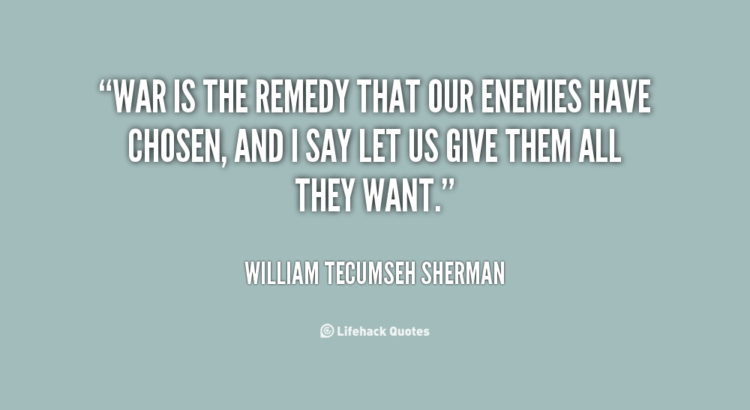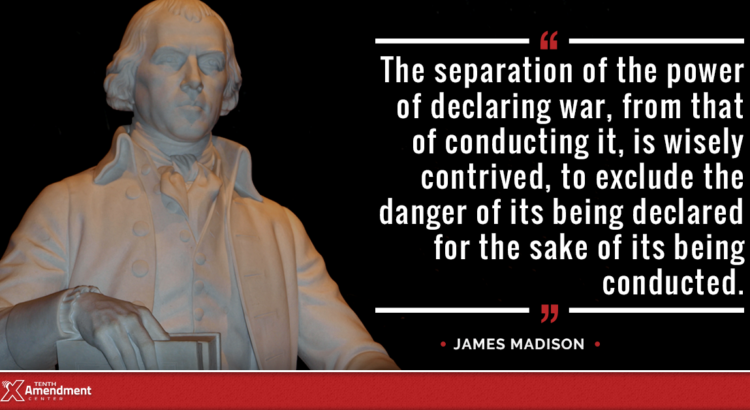In last week’s essay (To Declare or Not to Declare, that Is the Question – Part VII) I alluded to the fact that the United States has forgotten how to wage war. We have forgotten what the nature of war is and the purpose of it.
The purpose of war is not to facilitate “nation-building”, nor is it to “spread democracy.” Unless a nation is a bent on conquest and subjugation, free nations engage in war only as a defensive matter of self-preservation. When it comes to self-preservation war is a matter of kill or be killed, and all options should be on the table as they were in WWII. Today we try to wage “polite war”, but no such thing exists. We are too concerned about political correctness in how we conduct military actions. War is horrible and should be resorted to only as a last measure due to the suffering it causes on both sides of the conflict.
My take on the approach to waging war is what I term the “Mr. Miyagi Philosophy of War.” In the movie “Karate Kid III”, the wise Mr. Miyagi has taken a young teenage girl named Julie under his tutelage. One evening while walking home alone she is accosted by a group of boys in a judo club and harassed. Off to the side you hear this soft, quiet voice say to them, “Leave girl alone.” They look, and begin laughing at and taunting this little old man telling them to back off. If you’ve seen the movie, you know that that little old man defeats all of the boys who run off with their “tails between their legs.” Julie gets all excited about how Mr. Miyagi “kicked butt”, and here is the wisdom in their conversation:
Juile: That was great, Mr. Miyagi.
Mr. Miyagi: Not great. Miyagi always look for way not to fight. Miyagi hate fighting, was most unfortunate.
Julie: Unfortunate? Come on! Aren’t you glad you kicked some guy’s butt?
Mr. Miyagi: Not want to kick anything. Was most unfortunate their butts attached to small brain.
Julie: Mr. Miyagi, come on admit it. We kicked some butt.
Mr. Miyagi: Julie-san, fighting not good. But if must fight… win.
As related to our subject matter, to paraphrase that last line, “War is not good. But if must fight…win!”
Consider what we did in WWII. On February 13, 1945, the allies fire-bombed the city of Dresden, Germany, killing an estimated 135,000 civilians (or more) in one night. On March 9, 1945, the US fire-bombed Toyoko, Japan and killed at least 130,000 civilians. Then of course there were the two nuclear attacks on Hiroshima and Nagasaki. The purpose was to try and force those nations to sue for peace and bring an end to the conflict and to preserve American and allied lives.
Today, in our war against those seeking to do us harm, in a formal declaration of war Congress should make it plain that as horrible as it may seem, we will unleash all of our might against those enemies and anyone who aligns themselves with them, shelters them, or remains in their vicinity may very well suffer the same fate as them.
General William Tecumseh Sherman understood how horrible war was, but it didn’t stop him from being ruthless in prosecuting it. I leave you with some of his words of wisdom about war and how to wage it:
“War is the remedy that our enemies have chosen, and I say let us give them all they want.”
“I would make this war as severe as possible, and show no symptoms of tiring till the South begs for mercy.”
“My aim, then, was to whip the rebels, to humble their pride, to follow them to their inmost recesses, and make them fear and dread us.”
“War is cruelty. There is no use trying to reform it. The crueler it is, the sooner it will be over.”
“War is at its best barbarism.”
“If the people raise a great howl against my barbarity and cruelty, I will answer that war is war, and not popularity seeking.”
“There’s many a boy here today who looks on war as all glory but it is all hell.”
And finally,
“Every attempt to make war easy and safe will result in humiliation and disaster.”
Would that more of our leaders had the attitude of General Sherman; then maybe there would be fewer American servicemen and women losing their lives and we as a people could dwell in peace and safety. As Mr. Miyagi said, “if must fight…win!”
-June 23, 2017

